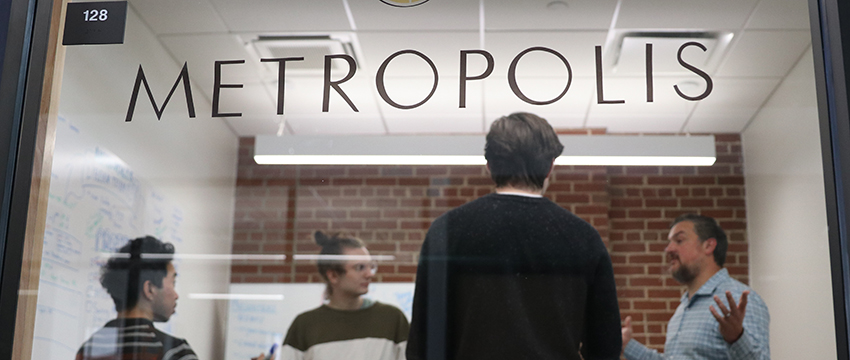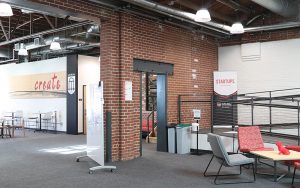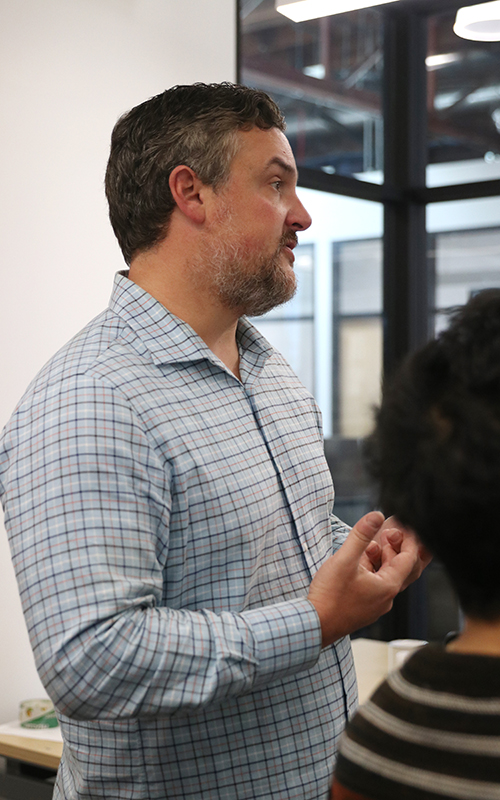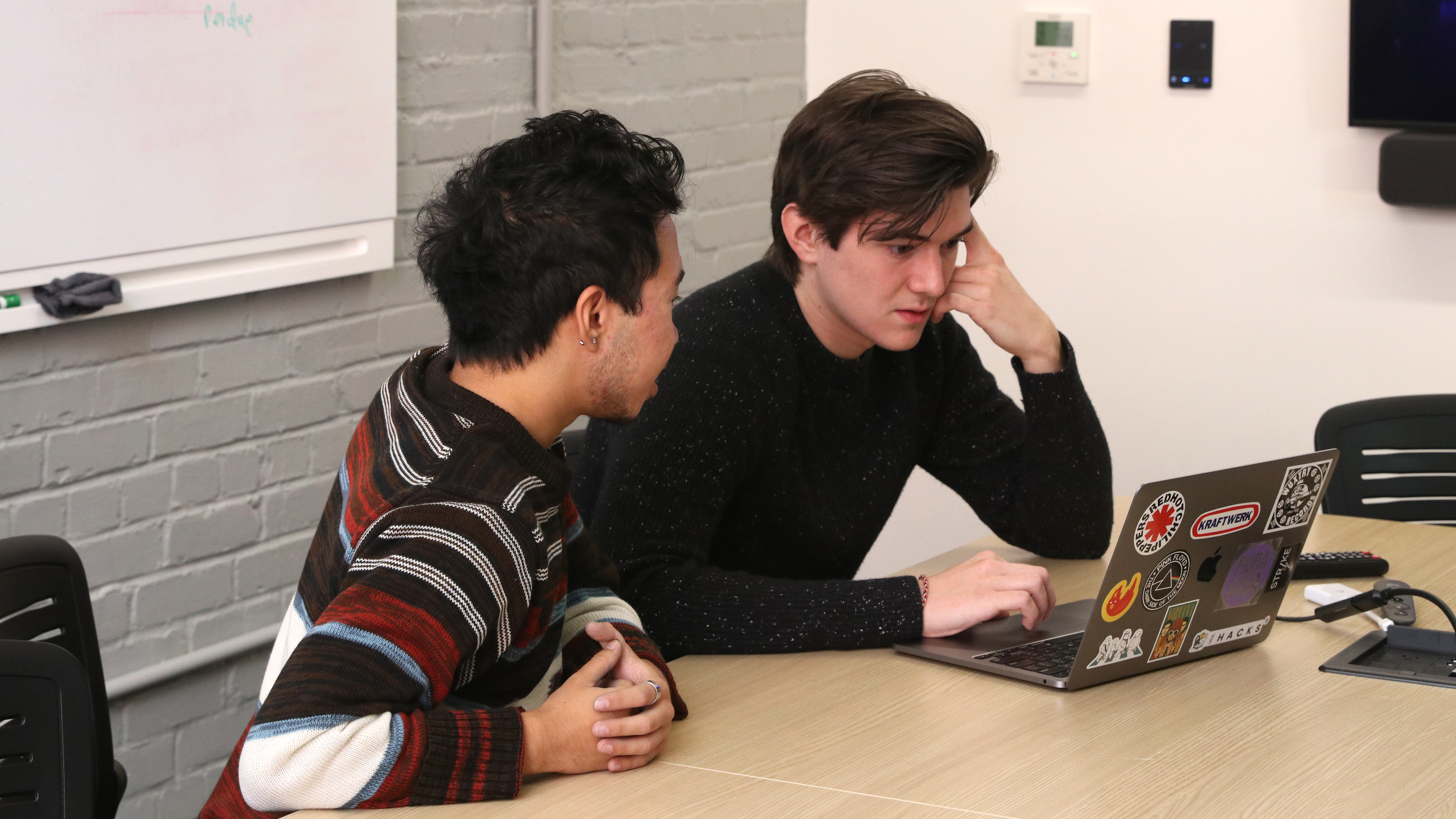NMI students thrive in Innovation District

NMI students thrive in Innovation District
Nicholas Kreitz pours a cup of coffee, exchanges a few words with his boss as they pass one another by the kitchenette and slings his backpack over his shoulder as he heads to his office.
His office is in the new University of Georgia Delta Innovation Hub, a sleek renovated warehouse with high ceilings, exposed brick and glass walls that invite passers-by to view the collaboration and idea formulation taking place within the collaborative spaces.
Kreitz’s office is surrounded by floor-to-ceiling white boards, which don’t look very white because there is so much blue, red and green writing: numerals and jargon and dates that appear to be haphazardly recorded, but most likely make sense to those who need to read them.
Gaining professional experience on campus in a tech field is an opportunity Kreitz does not take for granted.
“It’s been a great experience being here,” Kreitz said. “Being on campus and being one of the first companies and first students to be involved with that is an honor.”
The chance to earn a paycheck for a job that will set the stage for his future career, isn’t bad either.

“Earning money through the actual field I want to have a career in versus working at a restaurant is one of the greatest things,” he continued. “I have worked different retail and service jobs, but this one feels like I am just doing something that I love, and I don’t even realize I am at work.”
Tapping into student talent
The accessibility to tap into student talent was a huge draw for Scott Edwards, an alumnus of Family & Consumer Sciences, when he considered returning to Athens as one of UGA’s inaugural entrepreneurial companies in the Innovation Hub. Edwards, CEO and co-founder of Metropolis.tech and its parent company, Adaptive Medical Partners, relocated product development for Metropolis from Irving, Texas.
“It was really interesting to me that you could give projects to the students that were real life problems, real world issues, and they could get class credit [for solving them],” Edwards said.
The Innovation District is an initiative by the University of Georgia to foster innovation, entrepreneurship and learning. Among the goals of the program are a focus on increasing university and industry collaboration, while providing experiential learning opportunities for students.
The New Media Institute at Grady College is a partner organization with the Innovation District and Chris Gerlach, an academic professional with NMI, serves on the Innovation District Advisory Council.

Edwards met Gerlach when Metropolis was considering the move to Athens and was impressed with the possibilities the NMI students could provide his young start-up.
“NMI has found me probably the best software engineers I have ever worked with,” Edwards said. “They have exceeded my expectations in every way. They help me chase that vision and they do it with unbelievable coding, user interface, user experience and machine learning components.”
Metropolis.tech calls itself a marketplace for healthcare jobs. It matches doctors and other healthcare professionals with providers who are hiring. The service meets a demand that is frequently constrained due to lack of time by physicians to look for jobs. Because of the sensitive nature of healthcare providers moving, all parties remain anonymous until the match has been made.
NMI identified Kreitz and fellow NMI student Aries Aviles, a computer science major, as students who had the skills, initiative and education Edwards was seeking. They had both taken a combination of iOS app development and rich media production classes through the NMI and had a strong foundation in new media production. Edwards interviewed and hired them for internships before moving to Athens.
Aviles recommended classmate Calvin Butson, a data and computer science major, when the need for someone with increased knowledge of artificial intelligence and machine learning became apparent.
“As a team we’ve looked at what we’ve accomplished and we are just amazed,” Aviles said. “We are learning new computer languages together that we haven’t learned before, but we are also branching out and pushing the boundaries about what can we do and what can we create.”
Since their internships started in the summer, Edwards has been so impressed with their work that he invited the trio back this fall. And, while they packed in 40+-hour work weeks during the summer, the work load has gone down to 20-hours a week while school is in session.
“That’s the biggest challenge working with the students,” Edwards reluctantly admits. “School gets in the way…but, school comes first and I would have it no other way,” Edwards adds.
Scaling Up and Looking Ahead
The team of interns that Edwards has gathered has proven that the model works that UGA envisioned when starting the Innovation District, and he has full confidence in their abilities.
“If I dream it, they can build it,” Edwards says. “It’s that simple, which is crazy. If someone had told me that beforehand, I would have said they are full of it. But now that I’m here and I have actually worked with these students, [I know] they are as capable as anybody out there who is working for a major, huge company as a software engineer.”

The interns, too, know a good experience when they see it.
Kreitz, for example, received an attractive offer to intern at a global technology company last summer at the same time he received his offer at Metropolis. He chose the Metropolis offer because he liked the fact it was a small company where he could be more involved with product development. It also aligned with his future desires of starting his own company someday.
One of the projects Kreitz branched off and developed on his own is an internal analytics dashboard for the product that can be used instead of manually gathering data.
“With the knowledge that I have learned from UGA classes and the NMI, I was able to put together a web application that they could use to look at internal stats and sales. Being able to do that as an intern and have an actual impact on other employees is a big thing for me,” Kreitz continued.
Edwards is excited by that innovation and wants to continue scaling up his operation using students to help him. Since the introduction to NMI and programs at Grady College, Edwards has started working with students in the Emerging Media program, Grady’s graduate degree that focuses on emerging digital technologies and design solutions. The Emerging Media team works on SEO, UX design and website marketing for Metropolis. Additionally, a new partnership has recently started with Grady’s Talking Dog, a student-run advertising and public relations agency, which is helping Metropolis with brand messaging, ad placements and product trials.
Edwards knows that start-up tech projects like this will keep more graduates in the area once they have their diplomas in hand.
“There’s not anything they can’t do,” he concludes. “And some things that they can’t do, they are teaching themselves and they are doing very quickly. That does not put a ceiling on their potential. You are never done innovating.”
While Edwards continues thinking of the future of Metropolis, Aviles and Kreitz are thinking about their futures after graduation. Whether they continue at Metropolis for a while or branch off to other professional adventures, the experience they have earned through the Innovation District allows them to bypass the entry-level market with real world experience and working apps they can show future employers.
With the future uncertain, Kreitz knows one thing for certain: “It’s very cool to place down the building blocks that Metropolis will live off of in the future.”
